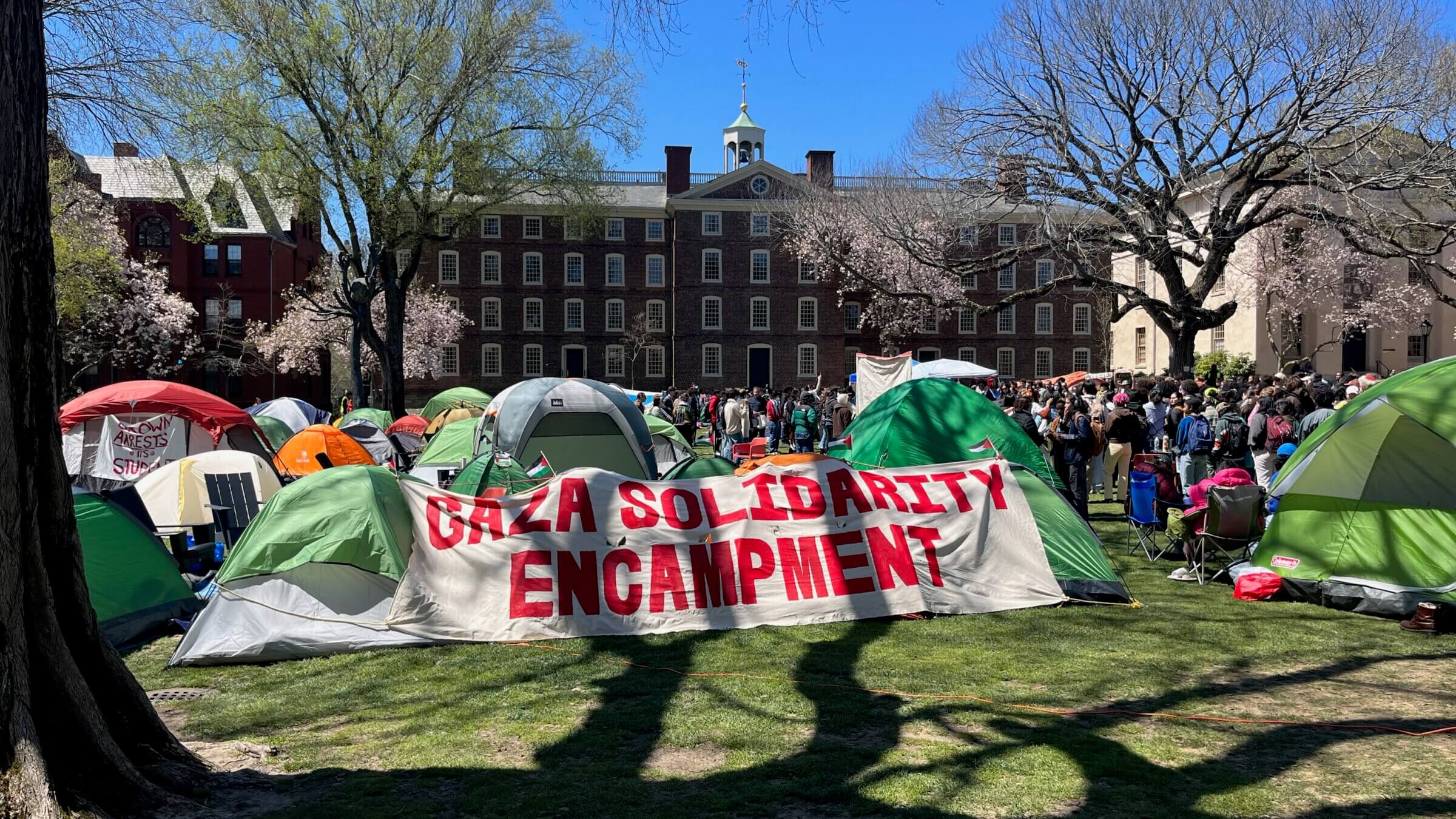Brown president tries a less confrontational approach to students’ Gaza encampment
President Cristina Paxson said the tents are ‘not an arrestable offense,’ striking a sharp contrast with other universities cracking down on protests

The encampment on Brown’s main green. Photo by Emily Tatham Harrington
PROVIDENCE, R.I. — As “Gaza solidarity encampments” sprouted up this week on campuses across the nation, and colleges called in police forces to arrest hundreds of students for trespassing and other violations, Brown University took a different tack.
When Brown student protesters set up tents on the campus’ main green Wednesday morning, the Rhode Island university said there would not be arrests, nor immediate suspensions. And, unlike Columbia and Harvard, which closed their campuses to anyone without a student or faculty ID, Brown’s main green remained open to the public on Thursday afternoon.
“Encamping on the University’s historic and residential greens is a violation of University policy — and therefore the appropriate conduct steps will be taken,” wrote Brown’s president, Christina Paxson in an email sent to the university community on Wednesday, referring to internal university disciplinary proceedings. But she clarified that breaking this university rule would not prompt a call to police: “Encamping itself is not an arrestable offense.”
And she distinguished Brown from other colleges where crackdowns on student activism have sparked debates over free speech. She referred to “insidious suggestions” about suspending, firing or expelling faculty and students based on their views, and infringing on their privacy and right to due process.
“I am writing to assure you that this will not happen at Brown,” she wrote.
She added that there would be repercussions for violent or intimidating behavior, including possibly arrest. But, she said, she had not yet seen such behavior.
At Columbia, administrators called in the New York City police, who arrested more than 100 students on Thursday after they established the “Gaza Solidarity Encampment” on the college’s main quadrangle. The action made headlines globally, and drew more students to the encampment, as well as outside groups who gathered outside the locked campus gates to support the student protesters inside. New York Mayor Eric Adams and others have blamed these outsiders for much of the violence and antisemitism reported at the protests.
Brown’s administration may have noted how turmoil at Columbia intensified after the arrests — or drawn from its own experience after arresting 41 students at sit-ins for divestment in November and December — and decided on a less confrontational response.
Rafi Ash, a sophomore at Brown in the encampment, called Paxson’s email “ironic,” noting that until last week, Brown had arrested more student activists since Oct. 7 than any other university. (Ash was arrested at a November sit-in.)
But the administration has not left the protestors completely in peace this week. Organizers from the Brown Divest Coalition, BrownU Jews for Ceasefire Now, and other groups organizing the protest reported on Instagram that campus officials and police have asked them to present their IDs and taken their names. Those students, according to a statement from the provost’s office, may face disciplinary proceedings for violating the school’s policy on the use of campus greens, which requires university approval for activities involving more than 50 people. But unlike other universities that abruptly suspended students, Brown is still promising a full investigative process before any sanctions might be applied.
Still, Brown’s relatively tempered response may not prevent the encampment or protests on the campus from growing. An Instagram post from the Brown Divest Coalition, widely shared by other groups on campus, called the threat of the conduct process “unprecedented” and urged students to join the demonstration and register their IDs en masse.
“The only response to Brown’s attempt to single out individual students encamping will be to flood them with hundreds of people,” the post said. “We have safety in numbers!”
Additional reporting contributed by Emily Tatham Harrington.















